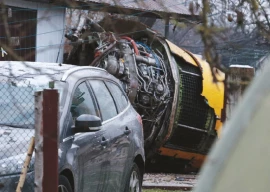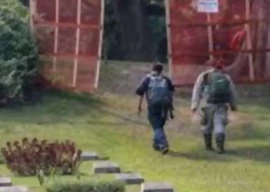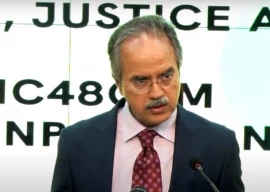
The Egyptian government has offered a series of concessions at the first talks with opposition groups, including the Islamist Muslim Brotherhood, in an attempt to end the mass pro-democracy protests across the country.
But opposition leaders said that Egypt’s vice-president and longtime intelligence chief, Omar Suleiman, did not go far enough in his proposals for greater political freedom and pledge of free elections, The Guardian reported.
Meanwhile, Cairo’s dismal appearance was intensified by its gray skyline today as it rained slightly. Graffiti denouncing President Mubarak covers the walls and garbage lies on the streets since life had essentially stopped for the past week and a half during the protests, violence, and looting.
Despite smaller numbers, protesters continued to gather in Cairo’s Tahrir Square as citizens went back to work. The mood in Cairo was tense as soldiers checked identity cards of citizens before letting them into high security areas, including the square. It is sealed off by steel barracks with military men blocking the entrances; many one-way streets have also become two-way to ease the flow of traffic past military tanks in the area. In other districts of Cairo, soldiers are practically living out of their tanks; hanging their clothing to dry, taking naps in military cars, and watching the news on Egyptian State Television.
Several, but not all banks reopened today as well for a few hours, where there were long lines and fears regarding mass withdrawals although the government has instructed banks to put restrictions on withdrawal amounts. But the Egyptian Stock Market, which was hit hard by the protests early on, remains closed.
On the political front, more talks were held between Vice President Omar Suleiman and six opposition groups, representing both official parties such as the Wafd and Tagammu, as well as the Muslim Brotherhood, Egypt’s largest opposition group, and representatives of the “January 25th youth.” The talks represent a milestone in Egyptian politics, given the fact that there is actual dialogue taking place with the involvement of the Muslim Brotherhood. Initially, the Brotherhood refused to hold talks with the recently appointed Vice President. However, the tone changed almost overnight, which was also the case with the Wafd and Tagammu parties, who were initially hesitant.
The Muslim Brotherhood has been a sensitive spot for the regime and the West, which is cautious of their popularity among poorer sectors of society. Although outlawed in 1954, the group began gaining extensive popularity because they address the vacuum the government fails to satisfy; namely, the provision of basic social services.
Still, the opposition have argued that government concessions so far are insufficient and they will not stop protesting before more is done; particularly the resignation of the President. Interestingly enough, this rhetoric came most strongly today from the Muslim Brotherhood, whom many have accused of “riding the tide” of the youth protesters, since they have not been the main actors in this movement.
One of the Brotherhood’s prominent figures, Essam El-Erian, stated that the government did not “respond to most of our demands. They only responded to some of our demands, but in a superficial way.” This is despite the fact that several prominent National Democratic Party officials, including President Mubarak’s son, Gamal, have resigned from the ruling party and indicated their distance from the political arena.
President Mubarak has not indicated he will be leaving anytime soon and VP Suleiman has stated that he will not take the presidency. In an interview with ABC, Suleiman said that he cannot take the presidency as stipulated by the current constitution since he is “not from any party.”
At the end of talks, a statement was issued pointing to the progress that was made during the dialogue. The statement focused on three areas which covered a range of topics. Briefly, significant points include the satisfaction of promises made by President Mubarak in his February 1st, 2011 speech; the establishment of a committee of experts to determine and recommend amendments to the constitution and legislative arrangements as well as the potential removal of the State of Emergency when possible, which has been in place since President Mubarak took power; and finally, the initiation of a committee made up of experts and the opposition members to continue working with the VP.
One Cairo resident, Lamia, who requested to be known by her first name only, stated that she believes progress is being made, “although [she is] not sure who to trust anymore.”
Published in The Express Tribune, February 7th, 2011.


1732519298-0/BeFunky-collage-(85)1732519298-0-165x106.webp)
1732611352-0/lamar-(5)1732611352-0-165x106.webp)
1732610018-0/BeFunky-collage-(91)1732610018-0-165x106.webp)












COMMENTS
Comments are moderated and generally will be posted if they are on-topic and not abusive.
For more information, please see our Comments FAQ